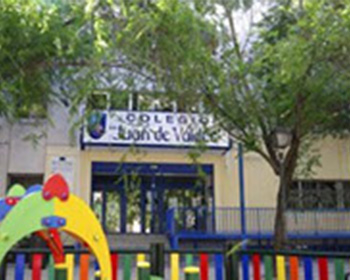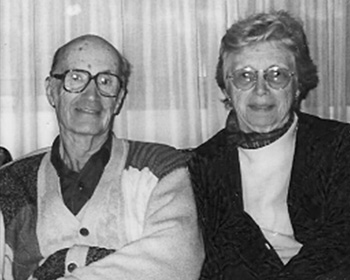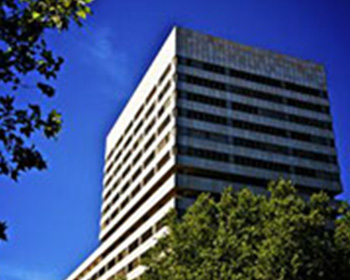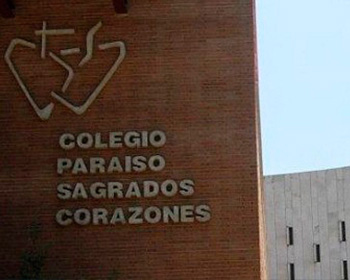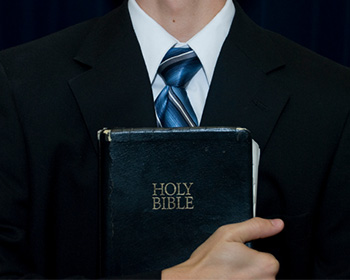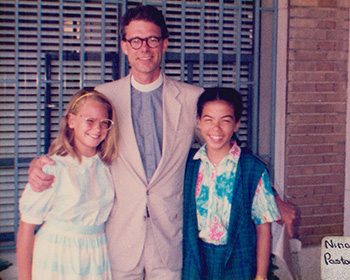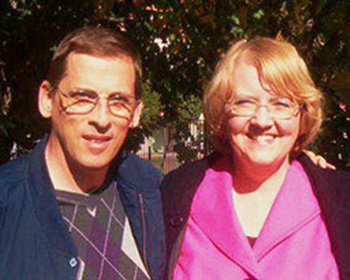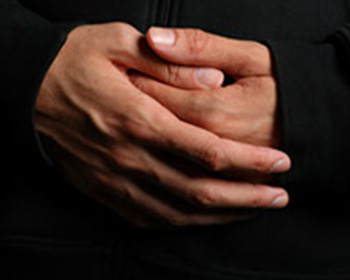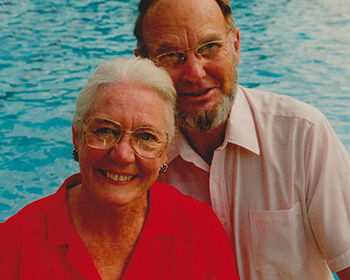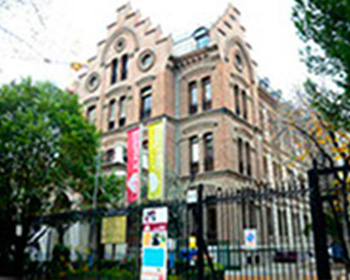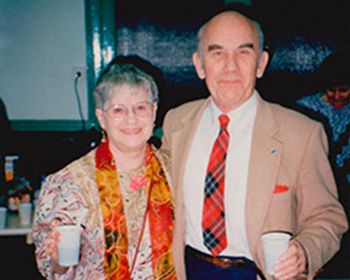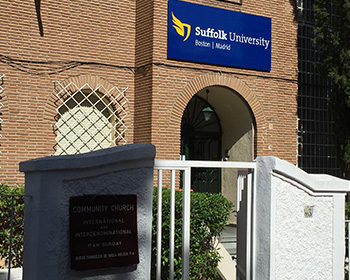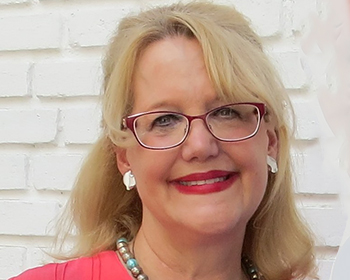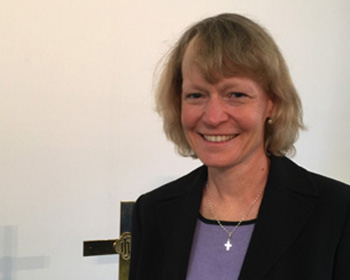HISTORY
THE FIRST 43 YEARS: ABRIDGED BRIEF HISTORY OF THE COMMUNITY CHURCH OF MADRID
By George P. McCallum (edited by Kirk Tennant and Chris Berry)
On Sunday, April 25, 1971, the Service of Organization of the Community Church of Madrid was held at the Eurobuilding in Madrid, Spain. In the fall of that year a letter was sent out to those English speakers of Madrid who might be interested in forming such a church. It told prospective members:
"We are an experimental parish, with a flexible organization, meeting in temporary headquarters here in the Eurobuilding. Our basic purpose is to proclaim the gospel of the Lord Jesus Christ and to provide worship services in the English language, plus whatever else seems useful and valid as we go forward. We seek to minister to English speaking residents of Madrid, as well as tourists, and our services are open to all worshippers of whatever nationality or race."
"Doctrinally we accept the basis of the World Council of Churches: we are ‘a fellowship of Christians who confess the Lord Jesus Christ as God and Savior according to the Scriptures and therefore seek to fulfill together our common calling to the glory of the one God, Father, Son and Holy Spirit.’ We are also related to the Department for Churchmen Overseas of the National Council of the Churches of Christ in the U.S.A. Ecumenically, we relate to the Spanish Evangelical Church, representing historic Reformation Protestantism in Spain, and also to other Protestants as well as to Roman Catholics here in Spain. We welcome the involvement of all Christians in the life and work of this congregation!"
In his book Church Without Walls (Hope Publishing House, Pasadena, CA, 1984), founding Pastor Thomas Goslin II devotes his first chapter to the Community Church of Madrid.
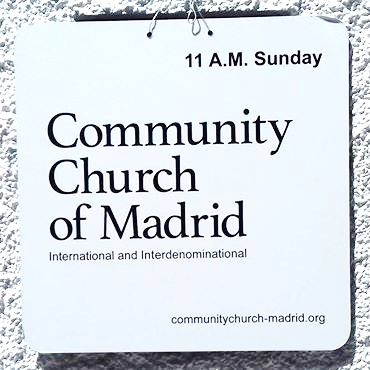
Building a church without walls was something I stumbled into during a missionary term in Madrid, Spain. It turned out to be the most exciting and happiest experience of my ministry for I found myself surrounded by a congregation, which chose to have no building. Rather they opted for a life-style, which allowed them to concentrate their energies on supporting each other while remaining focused on the mission of the church. During these past 25 years the Community Church has remained faithful to the founders’ original ideas. It was decided at that initial meeting that this church would be interdenominational, international and ecumenical, open to everyone who wished to attend. The only thing the congregation would have in common, apart from its faith in Jesus Christ, would be the English language.
There were many subsequent meetings with more interested people attending. The name of "Community Church of Madrid" was agreed to by all. Other important decisions were made and a constitution was written. One of the most significant decisions was never to construct a building; this, too, was agreed to by all. It was felt that in Madrid, where facilities were not difficult to find and where rents were not prohibitive, this was in keeping with the philosophy of the founders. Thus the money it would take for the church’s own building could be used for charitable work.
The first worship service of the Community Church was held in March, 1970, in the Colegio Evangelico Juan de Valdes, a Spanish Protestant school on the Castellana, with Rev. Goslin preaching. Thanks to Organizing Committee Chairman Elton Anderson and his business connections with the Eurobuilding, it became possible for the CCM to hold its services in this beautiful new hotel. For the following 7 years the Eurobuilding was our place of worship; each Sunday would find the congregation in a different section of the hotel, depending on which room was available that day. After a time, however, because of an increase in business at the Eurobuilding and the need for them to use all their available space, it was no longer possible for the CCM to use their facilities. After considerable searching the church received an invitation out of the blue from the nuns of the Colegio de Sagrados Corazones, just opposite the Eurobuilding on Calle Padre Damian. This large modem girls’ school was closed on Sundays, thus making their chapel available.
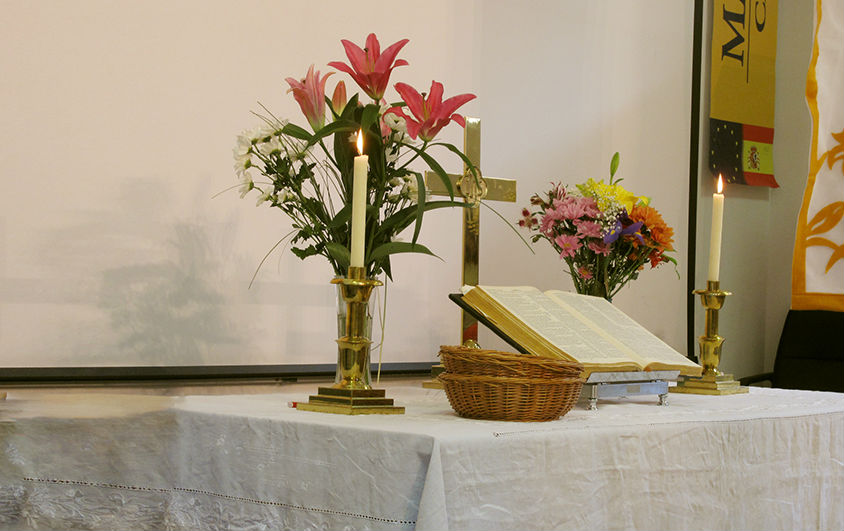
The Community Church continued having its services at the nuns’ school until the end of 1993, when yet another move was made, this time to the chapel of the Colegio El Porvenir, a Protestant school near Cuatro Caminos. One reason for this move was the need for more space for Sunday school as well as the fact that during the summer the Colegio de Sagrados Corazones was closed. Still another move was made to Suffolk University in 1998. The church continues to meet in this facility, but is once again suffering from growing pains as immigration to Spain by English-speaking persons is once again expanding. Perhaps the oldest tradition of the CCM and one that has endeared itself to the congregation is that of the post-sermon dialogue. It goes back to the earliest days of the church when Tom Goslin initiated it. The thrust is invariably in what transpires during the dialogue, and not what the pastor says. "To put it another way, the congregation completes the sermon. God’s people are all ministers and they can better be prepared for ministry if they are given an opportunity during worship to articulate their faith in Jesus Christ, and to share their Christian insights and experiences with their fellow believers."
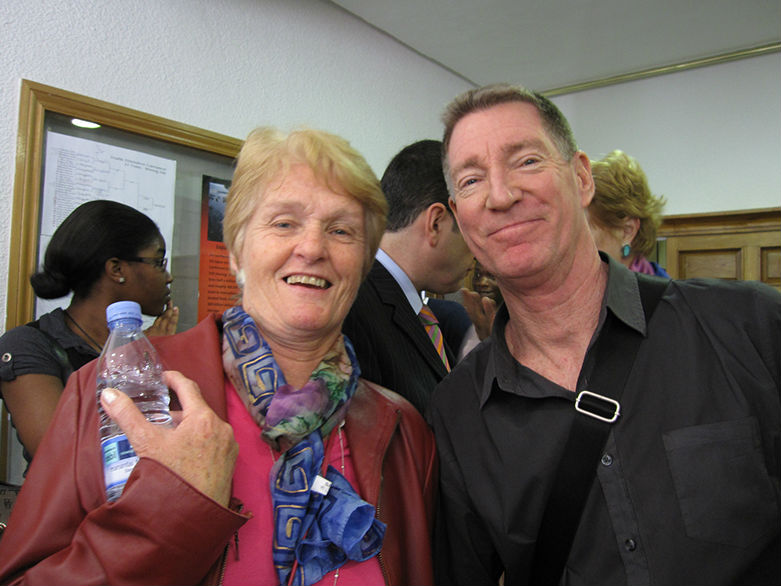
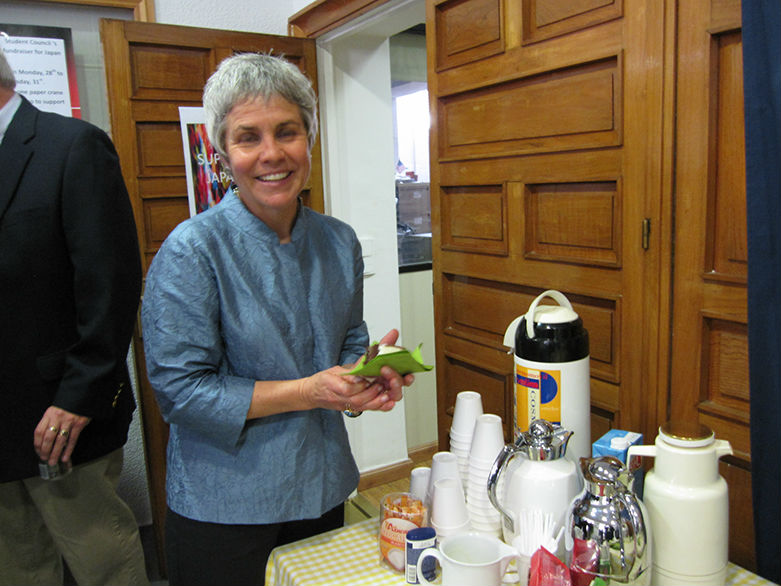
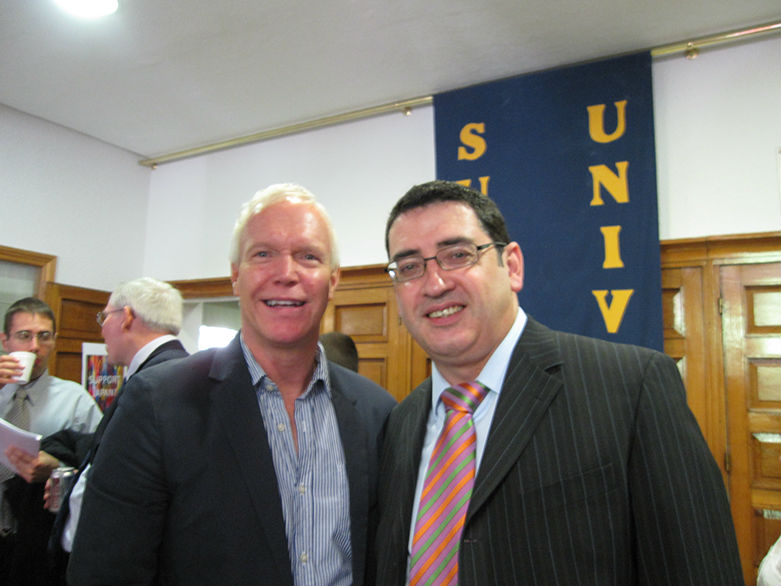
One of the unfortunate features of the Community Church, if there are any, is the much-too-rapid turnover of the congregation. So many members hold jobs whose organizations send them to one country for 2 or 3 years, then on to another country or back home to the main office. It is partially because of this that the CCM has an arrangement by which these people can become Associate Members, at the same time maintaining membership in their home churches. Although it is sad to bid these people goodbye when they leave Madrid, at the same time we are happy that others come to take their place. This transitory characteristic of the congregation also applies to its pastors.

- Tom Goslin II (Presbyterian) 1970-1982
- Robert Lazear (Presbyterian) 1982-1983
- Lawrence Wimmer (Methodist) 1983-1987
- Mark Abbott (Methodist) 1987-1990
- Raymond Richmond (Methodist) 1990-1991
- Richard Wilcox (United Church of Christ) 1991-1994
- James Thomas (Presbyterian) 1994-1996
- Horacio Rios (Methodist) 1996-1999
- Cathy Bingman (Methodist) 1999-2016
These pastors have brought their own individual talents and these have enriched the activities of the Community Church in a large variety of ways. In addition to other exciting innovations, in 1999, during her first year, Pastor Cathy Bingham introduced Sunday evening "Preaching Partners." During this special time Pastor Cathy shares the creation process of her sermons from a given Bible text with parishioners. This is truly a holy time for those who gather together in the Pastor's home.
Earlier in this history mention was made of the wide variety of people in the congregation and how it changes as these people leave and others take their place. On any given Sunday, the congregation will have people from almost every continent in attendance.
Sunday morning services at the CCM have never fallen into a routine. From the very beginning and partially because of its physical situation of having no building of its own the accent has been on innovation. When in the past the congregation arrived on Sunday morning they could never be sure just what kind of service they might be attending that day. Would it be a sermon followed by dialogue? Would there be a play by the children. The congregation soon becomes accustomed to this lack of sameness in CCM services.
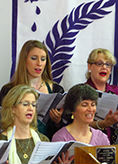
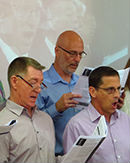
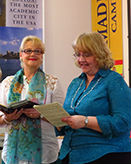
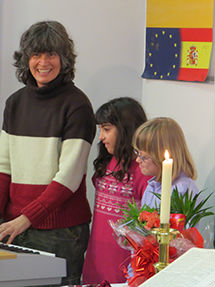
Now 43 years have passed. Four different buildings have housed the Community Church of Madrid. Nine different pastors have been its spiritual leaders. Hundreds of people from all over the globe have attended its services. Where does it go from here? We cannot say, but surely whatever the future holds for the Community Church of Madrid one thing is certain: Jesus Christ will, as in the past, inspire it to go forward in its mission to provide spiritual leadership for and ministry to English-speaking Christians, and, for that matter, all others, too, in Madrid.
